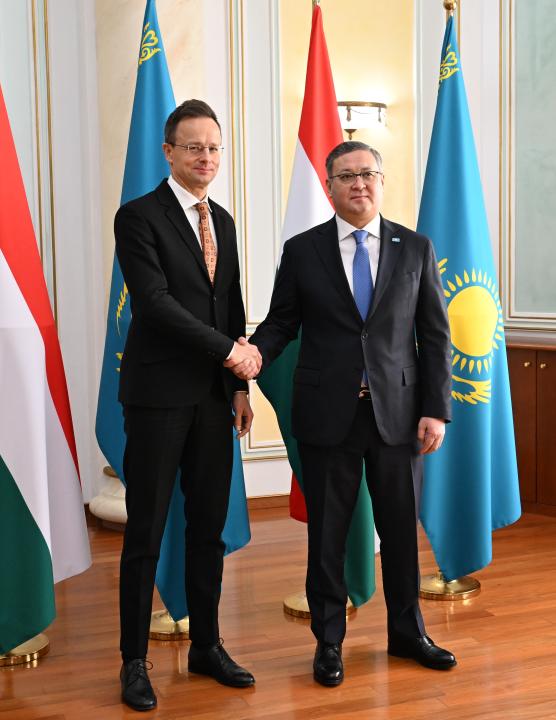ASTANA – Kazakh Deputy Prime Minister and Foreign Minister Murat Nurtleu and Hungarian Minister of Foreign Affairs and Trade Péter Szijjártó held talks in Astana on Feb. 17, reaffirming their commitment to deepening strategic ties and expanding economic cooperation.

Péter Szijjártó and Murat Nurtleu. Photo credit: Kazakh Foreign Ministry.
The discussions covered a wide range of bilateral topics, including political, economic, energy and cultural-humanitarian cooperation, reported the Kazakh Foreign Ministry’s press service.
The officials reviewed the implementation of agreements reached following the visits of Kazakh President Kassym-Jomart Tokayev to Budapest in November 2024 and Hungarian Prime Minister Viktor Orbán to Astana in November 2023.
Special emphasis was placed on boosting trade and economic relations. In 2024, bilateral trade grew by 4.4%, nearing $200 million. Nurtleu and Szijjártó agreed to take additional measures to achieve the goal set by the leaders of the two states: increasing the trade turnover to $1 billion.
Hungarian investments in Kazakhstan have exceeded $370 million, with 16 joint projects underway worth $700 million. Notable initiatives include Hungarian oil and gas company MOL’s $200 million investment in Kazakhstan’s Rozhkovskoye gas condensate field and Globalia’s construction of solar power plants across the country. UBM Holding is also set to build three animal feed production plants worth $62 million this year.
Further steps to deepen economic ties were discussed, including opening Hungarian bank branches in Kazakhstan, constructing a multimodal cargo terminal in Budapest, boosting Kazakh oil exports to Hungary, and establishing uranium and critical mineral trade. A significant move in these efforts will be the creation of a joint investment fund.
Both ministers also focused on enhancing cooperation in science and education. Hungary offers 250 annual scholarships to Kazakh students, with nearly 1,000 currently studying in Hungarian universities. A new direct air route between Shymkent and Budapest will launch in May, further strengthening the bilateral relationship and creating new opportunities for collaboration.
The two officials also discussed the potential for further cooperation within international organizations such as the UN and the Organization for Security and Cooperation in Europe (OSCE). Acknowledging Hungary’s active role in the Organization of Turkic States (OTS), they highlighted the upcoming informal OTS Summit in Budapest as an important step in promoting collaboration among Turkic heritage nations.
The visit concluded with the signing of memorandums of cooperation between diplomatic academies and for the promotion of Hungarian language studies. Currently, nearly 30 Hungarian companies and 40 joint ventures operate in Kazakhstan. Since 2005, the volume of Hungarian direct investment in the Kazakh economy has exceeded $370 million.
